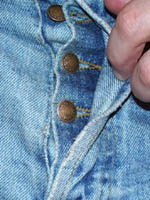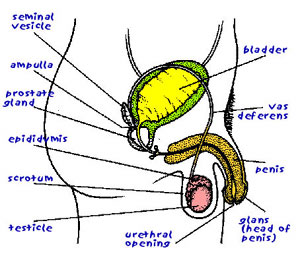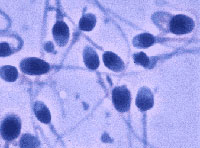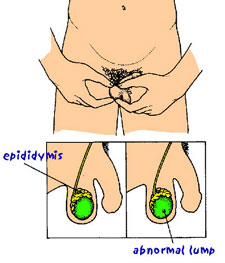

We would like to say a Big Thank you to Malehealth.co.uk for providing the following Information. Please check out their website and the ones at the bottom of the page for lots more information about male health and fitness.
|
Frequently asked questions about the male tackle
We get more questions about the male tackle than any other subject. We've gone through the lot and tried to answer them in this section. If you read the whole thing you should find the answer to whatever is bugging you. If you can't, drop us an email but remember we can't answer your question individually although we will try to update the site. First up, here's your tackle in
technicolour complete with a few technical terms that we use in the
section. Sperm are manufactured in the testicles and pass along the epididymis where matured sperm hang out. The epididymis is a microscopically narrow tube 6m long folded into a space of 5cm - an engineering masterpiece. Just before you come the sperm travel along two narrow tubes of muscle called vas deferens. These meet with the seminal vesicles which are behind the bladder just above the prostate gland. The seminal vesicles and the prostate gland add their own secretions to the semen. These fluids are alkaline which protect the sperm from the acid in the vagina. At orgasm, the semen is propelled from two ejaculatory ducts along the urethra which runs the length of the penis and out of the urethral opening.
|
|
Please click on the link to see the answer
|
|
1) Circumcision FAQs
Circumcision in men involves the cutting off of the foreskin protecting the head (or glans) of the penis. As the only moving part of the penis, the foreskin facilitates sexual activity. It contains nerve endings that play a part in sexual pleasure and its glands produce lubricants that help protect both the head of the penis and the female vagina. It is generally removed for religious reasons but may take place for medical ones. Stop youíre making my eyes water. Why is it such a controversial subject? Circumcision is a painful subject in more ways than one. Wars have even been fought over it. Because of its religious associations, it can be difficult for people to talk about circumcision on health terms alone. Malehealth, however, deals only with the health side. Many men are happy with their circumcisions but weíve had emails from men who are suicidal because of the problems resulting from their circumcision. We even heard from a terrified fifteen year-old who had been told at school that if his glans was not visible when he had an erection he would have to be circumcised. Our doctorís reaction? ĎWho is teaching this guff?í If youíre considering circumcision for yourself or a child, youíll want to know all the facts not just the religious ones. Fact number one is that the foreskin is perfectly healthy and harmless and, like any other human tissue, should only be removed for a good reason. Whatever your personal views on what constitutes good reason, remember that no surgery is without risk and that circumcision is surgery in a very delicate place that can fundamentally effect both physical and psychological well-being. How many men are circumcised? Nobody really knows but organisations campaigning against it estimate that worldwide about one in four males are circumcised. National rates vary widely from about 80% of males in the USA to 2% in Sweden, where non-medical circumcision is now illegal in children. In the UK, the number of circumcisions for medical reasons has fallen from 35% of English boys in the 1930s to 6.5% in the 1980s and today some 12,200 such circumcisions are performed annually. Some doctors consider that this is still far too many. What are the medical reasons for circumcision? There are three main reasons for circumcision but doctors disgree on how promptly circumcision should be offered as the treatment. Some see it as a last resort; others will suggest it sooner.
There is little evidence of this. Circumcision in childhood - but not as an adult - may reduce the risk of penile cancer but this disease is very rare anyway and the real risk factors are poor personal hygiene and smoking. Indeed, the countries with the highest rates of circumcision (USA, for example) are also those with the highest rates of penile cancer.
Another controversial area. Some sexually transmitted diseases appear more common in uncircumcised men, others in circumcised men. Two particular concerns for circumcised men are that:
As regards AIDS, the iinternational not-for-profit health organisation the Cochrane Collaboration has reviewed all the research into circumcision and HIV and concluded that that there is insufficient evidence to support the idea that circumcised men have less chance of contracting HIV. However, it should be said that not all scientists agree with this. What everyone agrees on is that all men can reduce the risk of an STD or HIV by using a condom. Is circumcision safe? It is generally accepted that there are serious complications in perhaps 2% of medical circumcisions Ė 1 in 50. (Figures are obviously higher if the surgeon or hygiene practices are below hospital standard.) Complications include bleeding, infection, ulceration and psychological and sexual problems. The operation is generally carried out under local anaesthetic for boys and general anaesthetic for men. Usually, the patient is discharged the same day but many describe the operation and its aftermath as painful. Is it reversible? Some men think so. There are videos and packs available which claim to show circumcised men how to restore themselves but these should be approached with caution. Click here for an account from a doctor who successfully restored his foreskin. Are there alternative treatments for a tight foreskin? Yes. These include steroid creams, stretching methods and less-invasive surgery. Most physicians will try these before resorting to circumcision. Dr Ian Banks, president of the Menís Health Forum says: ĎIn the UK we circumcise boys and men more than most other European countries with no real evidence to support the practice. You should lubricate your penis well with a water based jelly and pull the foreskin increasingly further back until you can achieve a full retraction while the penis is flaccid. Do not do this with an erect penis as it may prove difficult to bring the foreskin back to its rightful place. Real eye watering stuff. Once you can achieve this, and it may be painful, try doing it with the penis in various stages of increasing erection. Always return the foreskin immediately. If you leave it retracted while very tight it can cause the blood to remain inside the penis making it get even bigger (the basis of 'cock rings' and the vacuum device for impotence).í How can I avoid a tight foreskin? You'll like this one. Thereís one very easy way. A study in the British Journal of Sexual Medicine in 1997 of men aged 18-22 found that those with a tight foreskin either never masturbated or used an unusual technique. Once they did masturbate in a more conventional way (ie. an up and down motion mimicking sex), the problem righted itself in a few weeks.
The majority of religious circumcisions are carried out among Jewish, Muslim and African tribal communities. To Jews, the practice, which is usually carried out when a boy is eight days old, represents the covenant between Abraham and God. To Muslims, it as a sign of submission to God although most do not regard circumcision, which is not mentioned in the Koran, as obligatory. Those who oppose religious circumcision say it is a painful, psychologically damaging and oppressive tradition designed to subjugate the individual and his or her sexuality.
2) Coming FAQs
When you come or ejaculate, white semen containing sperm comes out of the end of your penis. It can happen during sex, during masturbation or even during the night in a dream. Itís perfectly normal. I come too soon/not soon enough. The main problems with ejaculation are coming too soon or not coming at all. If you come too quickly, remember this: every young man on the planet has come too soon at some time. It can be very embarrassing but, like death and taxes, itís a fact of life. In twenty years time youíll be wishing you still had the problem. If you're worried about coming too quickly - this is sometimes called premature ejaculation - click here. If you're worried about taking too long to come or not coming at all, click here. Iíve got blood in my semen. Is it serious? This is can be very scary but is usually harmless. A bit of rough sex or masturbation can cause it so you only need to seek help if it keeps on happening. In fact, only one in five cases have an obvious cause but very, very rarely it can be a sign of something more serious so see a doctor if it lasts a month or more. One less serious cause is Orchitis: the inflammation of one or, more rarely, two testicles, usually as a result of a bacterial or viral infection. Common causes include mumps - approximately one in four men who catch mumps will develop orchitis - and sexually transmitted infections such as chlamydia and gonorrhea. In epididymo-orchitis, the epididymis - the sperm-carrying tube attached to the testicle - is also affected. 3) Erections FAQs
Well, whatever turns you on basically but the hard science is this: erections occur when the small muscles in your penis, which are usually tightly contracted, relax and let blood start flowing in. The spongy tissue in the penis fills with blood and expands, pushing against the veins and closing them so the blood cannot drain out again. Well, you did ask. Why can't I get an erection? There are two things that men complain about in the erection department Ė not getting one when you want one and getting one when you donít want one. Not getting an erection when you want one is usually called erectile dysfunction (ED) or sometimes impotence. ED is a better description because the problem can usually be solved. In fact, nearly all men suffer from ED from time to time. The official estimate is that impotence affects about one in ten men at any one time. (Incidence increases from about one in 13 in men under 30 to one in two in men over 70.) But some surveys have put it as high as one in four. Itís no big deal. Itís one of the things about being a flesh and blood human rather than a robot. Blokes who expect their penises to work like machines have not learned that yet. Donít worry about it but don't ignore it either. If it keeps happening, see a doctor. Why see a doctor about a bit of brewer's droop? Simply because ED can be an early warning of some serious health problems including:
Low testosterone levels are seldom the cause of ED. Research suggests that men donít seek help with ED because they donít think it can be treated. This is not true. There are many causes of ED, some physical, some psychological. You can read all about them here. There is usually a physical cause for ED Ė it is only purely psychological in about 25% cases - but whatever the cause worrying about sexual performance can make it worse. Anxiety contracts the muscles preventing blood entering the penis. If you get erections at night or when masturbating but have problems with your partner, itís almost certainly not a physical problem so just relax. Chances are youíll live to at least 80 so thereís plenty of time. And, as usual, smoking is a non-no. Nicotine interferes with the flow of blood to the penis making an erection less likely. Smokers are 50-80% more likely to become impotent than non-smokers.
Iíve got an erection all the time. Getting erections all the time may not sound like a problem but it can be. Young men can get sexually excited very easily so have a lot of erections. This can be embarrassing but itís not a problem and when youíre older youíll probably remember the days fondly. However, if your penis becomes hard for long periods or when youíre not sexually excited you may have a condition called priapism. The condition is painful, and requires prompt treatment to avoid the risk of permanent damage to the penis and ED in the future. (As a guide, any man whose erection continues for four hours or more, should see a doctor.)
4) Masturbation FAQs
It is rubbing your genitals - in your case, your penis - for sexual pleasure. Most men masturbate and, despite what they might say, so do many women. Itís perfectly normal. After all, our genitals are part of our bodies and pretty important to our future relationships so it would be surprising if we werenít just a little curious about them. Trying masturbating with your partner is a really good way to show each other what you like. But isn't masturbation bad for you? No. It is actually good for you. It will help you understand your body and your sexuality and what turns you on better. This may help you communicate with your partner more easily, enjoy sex more and avoid sex-related psychological problems. Frequent orgasms also help reduce the risk of prostate cancer while masturbation itself also reduces the likelihood of phimosis, a tightness of the foreskin. It can also cure a tight foreskin if you have that problem. The need for sexual pleasure is a natural human need, the same as the need for food and drink. When the urge strikes better to masturbate than exploit someone else with a oneĖnight stand or visit to a prostitute with all the problems, ethical as well as sexual, that these can pose. So are there any dangers
in masturbation? Nearly every casualty nurse has a story about a guy who claims to have been cleaning the house naked and have fallen over onto the vacuum cleaner with embarrassing results. None of the nurses believe these stories. Donít stick things down your penis either. As anybody who has had a cystoscopy (an examination of the bladder using a scope inserted through the urethra, the tube down the middle of your penis) will tell you, it bloody hurts. Anything that is pleasurable can become an addiction and masturbation is no different. If it begins to interfere with the rest of your life and youíre becoming more interested in it than in real sexual relationships with real people, you need to be careful. If you canít stop, you need to. There are organisations for people who are addicted in this way just as for other addictions such as Sexaholics Anonymous. Is it OK to use pornography when you masturbate? When you're a teenager looking at porn is part of a normal curiosity but using it when you're older depends on your view of the politics of porn. It's true that many women enjoy
pornography aimed at heterosexual men including even some of the
women who appear in it. But as with prostitution this is not always
the case and there is a lot of abuse of women in the porn industry. The
problem is is that by definition, pornography exploits women by treating
them as objects for sexual pleasure. Because you can't avoid that,
youíre probably better off skipping pornography if you can when
masturbating as it may affect your attitudes to women and spoil your
relationships with them. 5) Peeing FAQs
Is it definitely blood? If you have not been drinking enough water your urine can begin to look brown. Certain foods, like beetroot or certain drugs can also make your urine change colour. A heavy work-out can cause the urine to look red. Itís not actually blood but if it happens while youíre exercising or keeps happening youíll want to see your doctor. If it is blood and it keeps appearing in your urine it could be an infection of the urinary tract or it could be the sign of something more serious such as a prostate problem. See your doctor and try to take a urine sample. Why does it sting when I pee? This could also be a mild infection or a sign of a prostate or kidney problem. It could also be a sign of a sexually transmitted disease. If it persists, see your doctor. Do I piss too often? Only you know what has been normal
for you in the past and obviously, if you drink more you will urinate
more but as a very general rule of thumb, a man peeing 3-5 times a day
and no more than once at night is doing OK. If you are peeing more often
or have other symptoms such as pain, a slow start, a weak or
intermittent flow, a trickly finish or a feeling that you havenít
finished when you have or you are urinating when you don't intend to
then you should see your doctor. It may be a sign of something more
serious like a prostate
problem or diabetes. 6) The Penis FAQs
The penis is basically three cylinders of spongy erectile tissue full of blood vessels. The urethra, the bodyís outlet tube for both sperm and urine (although only one at a time), passes through the middle of the smallest of these - the corpus spongiosum - which is found on the underside of the penis. The corpus spongiosum expands at the tip to form the head of the penis called the glans. The glans is protected by the foreskin. My penis is too small/too big/the wrong shape. Penises come in all shapes and sizes with bumps and bends and visible veins, the lot. Genuine problems that might actually stop you peeing or enjoying sex are rare and usually picked up when you're very young - so, if you got through the nappy stage you're probably good to go. Whatever their size to begin with, all penises, when they're erect, are about the same length (between about five and a half and six and a quarter inches long). But it's no big deal. As the vagina can be big enough to let a baby out or small enough to hold a tampon, it can cope with any willy size without loss of performance. The size of the penis also varies a lot depending who measures it. In surveys when a doctor measures, the size drops by up to 50% compared to surveys where the owners of the penis measure them! If youíre worried about your penis size, have a proper look at it. When you look at your penis normally youíre looking down on it. Think about it. Itís like looking down on someone from the top of a building. Even basketball players look small when you look down on them from above. Hold a mirror at the side and have a proper look. Thatís more the sort of the view you get of another blokeís willy in the public lavatory. Honestly, very, very few men have willies that are too small or too big to have great sex with. Penile enlargement operations are, like any other surgery, potentially dangerous and you only have one penis. Liver transplants, kidney transplants and heart transplants are all possible. Penis transplants are not. Donít risk it. Anyway, many enlargement operations tend only to make your penis look bigger when limp not when erect. Dr Ian Banks, the Menís Health Forumís president says of penis enlargement: ĎMost claims from commercial organisations are either overblown or inaccurate.í Words like butchers and comboys come to mind. Why is my erect penis bent? Every penis is bit bent and a slight bend upwards is not just normal but desirable. You may have a problem if your penis is bent to the left or right so much as to make it difficult or even painful to enter your partner during sex. It could be condition called Peyronieís. This is not an Italian beer. Bent willies are very common and generally do not cause any problem with intercourse. Itís a matter of finding what fits, so to speak. If the Ďbendí is particularly bad, surgery can improve matters. More of Peyronie's Disease. Why is my penis itchy? Depending on where exactly it itches, there are a couple of possibilities If it itches on the glans and this is red and sore, it may be balanitis. (Greek for inflammation of the acorn!) Possible causes include poor hygiene, sensitivity to a new soap or shower gel or having sex with a woman with thrush. Try washing your penis carefully in warm, salty water. It could also be caused by a skin disease like psoriasis. If you think you may have this, see your doctor. If itís elsewhere in the groin area, it could be jock itch which is caused by the same fungus as athleteís foot - the tinea fungus. It thrives in warm, moist conditions which is a good description of the average blokeís pants. Wash with unperfumed soaps, dry thoroughly and avoid tight nylon underpants. (Sorry, Superman.) See your GP if the problem persists. Why is my penis
smelly/covered in white bits? Wash it. The foreskin has a natural lubricant underneath it called smegma. This helps you and your partner during sex. But if you donít wash regularly Ė once a day, no more - it can become unpleasant and smelly appearing as blotchy white bits. If left, this can become infected and cause irritation and balanitis. Why is my penis dribbling a discharge? If your penis produces something other than urine or semen. it could well be a sign of a sexually transmitted disease (STD). Other signs of an STD include itching or lumps and pain when peeing. Click here for more on STDs. Can the penis break? It can fracture if it bashes into an immovable object when erect. The most common cause is probably the womanís pubic bone. It can be healed through surgery and splints. Apparently I had hypospadias when I was a baby. What is that? In hypospadias, the opening of the urethra - from which the male urinates and ejaculates - appears in the wrong place, either on the head, shaft or underside of the penis. The usual estimate is that hypospadias affects one in 300 male babies but the evidence is that it is becoming more common. It can usually be corrected by surgery before the age of two. Click here for more on hypospadias written by a man with the condition. 7) Sperm FAQs
Well, it's quite a feat - a 300,000,000 to 1 shot. Sperm are tadpole-shaped and about 0.05mm long. From puberty onwards, at least 1,000 sperm a minute are manufactured in the testicles. They take about two and half months to mature and spend the last couple of weeks in the epididymis. Sperm swim at six inches a second but at the point of ejaculation they are propelled a lot faster - about 28mph along with the rest of the seminal fluid. Two minutes after entering the female, they're at the cervix and five minutes later at the fallopian tubes. During the most fertile part of the female menstrual cycle (when the egg is released - usually between the 12th and 18th day), this journey is much easier because at this time there is plenty of fertile mucus around for the sperm to live off. They can survive like this for a week. The average ejaculation contains 200-300 million sperm but it only takes one to fertilise the egg. (Just as well as only about 40 of them will get anywhere near the end of the race.) As well as fertilising the egg, the sperm contains the chromosomes which will determine the babyís sex. Is it true that sperm counts are falling? It appears to be. Research suggest that in the last fifty years or so, the number of sperm in the average western maleís semen has halved. Today, about one in seven Britons will seek advice on pregnancy difficulties at some time in their lives. The male will be the cause of the problem in around half of these cases. (About 70% of male infertility problems are caused by a low sperm count.) All the following can reduce sperm count:
What is a vasectomy? A vasectomy is an operation in which the two tubes that carry the sperm from the testicles, the vas deferens, are cut and the ends heat sealed to stop the sperm escaping. The procedure takes about 20 minutes under local anaesthetic and is not, theoretically, painful (although malehealth has heard from many men would argue this point). All surgery carries a risk of infection or worse. Once the seminal vesicles are empty, a vasectomy is the single best method of contraception (99.8% effective). Used properly condoms are 98% effective.
8) Testicle and Testosterone FAQs
Good question. But we're all like that. It's 100% normal. How do I check my balls for lumps? Itís pretty easy. Itís best to examine your testicles after a warm bath or shower.
The picture should show you what you need to know. But if you want to see a video of it (along with many other attractions such as Jonathan Ross with his hand down his pants and snooker player Steve Davis blasting his balls around the table) click here.
Is testosterone made in the testicles? Yes. Testosterone is the most important of the male hormones. (The ovaries produce it in lower levels in women.) It is responsible for muscle, bone and sexual development as well as sex drive. At puberty, it makes makes the voice drop and the penis, testicles and facial and pubic hair grow. In the prostate gland, testosterone is broken down into the related hormone dihydro-testosterone which appears to be involved in baldness and enlarged prostate. Testosterone levels fall slightly with age. Some men - particularly those with high levels to begin with - can effectively have half as much testosterone in their blood at 80 as at 20. It may lead to loss of muscle tone and bone strength and an increase in weight and the risk of heart disease and diabetes. Whether reduced testosterone is also the cause of the sluggishness, loss of libido and depression that some middle-aged men experience is debateable but it is worth thinking about. Testosterone replacement therapy is available but, while trials continue, many doctors are sceptical. Can you boost testosterone levels naturally? Yes. Taking more exercise and having more sex gets the hormones going. Also fat reduces the amount of testosterone available to the body so losing weight and cutting down on fatty foods and beer may help. Vitamin and mineral deficiencies
can worsen hormonal problems. Eat more seeds (particularly pumpkin and
sunflower seeds), shellfish, beans, yoghurt and lean meat. These are
high in zinc - the mineral essential for testosterone production.
Ginseng, stinging nettles and the South American herb Muira Puama are
also reputed to help. 9) Futher Info
There is also a general introduction to sexual health in its broadest sense in the Lifestyle and stuff section and feature articles on why it is important to tell your doctor if you have erection problems and king about sex can make it betterwhy only tal There are also question in the Ask The Doc section and lots of links under Second Opinion.
|
|
Other
Great Links!!!
|














 The
penis, as you have probably discovered, is used for peeing, making
babies and generally having fun with. You're very lucky to have one so
take care of it.
The
penis, as you have probably discovered, is used for peeing, making
babies and generally having fun with. You're very lucky to have one so
take care of it.
 What is circumcision?
What is circumcision? What happens when you come?
What happens when you come? What
causes an erection?
What
causes an erection? What
is masturbation?
What
is masturbation? Why
do I have blood in my urine?
Why
do I have blood in my urine? What
is the penis made of?
What
is the penis made of? I
know the little wrigglers make babies but how?
I
know the little wrigglers make babies but how? Why
is one testicle hanging lower than the other?
Why
is one testicle hanging lower than the other? Examine
yourself every couple of months or when you feel like it. Testicular
cancer is very uncommon so donít get obsessed with it. But if you do
find anything unusual, donít wait for it to disappear or start
throbbing - see your doctor.
Examine
yourself every couple of months or when you feel like it. Testicular
cancer is very uncommon so donít get obsessed with it. But if you do
find anything unusual, donít wait for it to disappear or start
throbbing - see your doctor. Tool-kit
is an introduction to your tackle in which we try to answer the common
questions. If you want further information, malehealth has excellent
sections in its A-Z of Health on
Tool-kit
is an introduction to your tackle in which we try to answer the common
questions. If you want further information, malehealth has excellent
sections in its A-Z of Health on